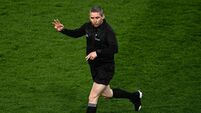Eimear Ryan: From here on for women's sport, there is no limit to our ambition

“You’d be envious of the girls coming through now.” This statement, or a version of it, has been recently said to me by at least three inter-county giants of women’s GAA. I’m sure it’s a sentiment that is deeply felt by many female players in the latter stages of their careers. Besides the envy, there’s a wistful joy in it, too. Things are getting better before our very eyes.












